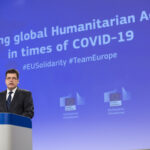- Stay Connected
EU floats Ethiopia sanctions over humanitarian aid
Ethiopian authorities and others obstructing humanitarian aid into the Tigray region could end up on an EU sanctions list, under a new idea floated by the European Commission.
The Brussels executive, on Wednesday (10 March), said it will consider listing people who violated international humanitarian law under its EU sanctions regimes.
The EU already has a law allowing visa-bans and asset-freezes against 12 categories of human-rights abusers, under its Magnitsky Act, named informally after a late Russian dissident.
These range from crimes against humanity, slavery, extrajudicial killings, to human-trafficking, and sexual violence.
But it was unclear whether humanitarian law violations would be retrofitted to the act as a 13th category, or whether the Commission was considering a novel legal instrument instead.
The comments were made by EU crisis commissioner Janez Lenarčič in a wider discussion on humanitarian aid.
Asked by a reporter on how to ensure aid access to Ethiopia’s war-torn Tigray region, Lenarčič noted several options.
“On how to ensure humanitarian access? There are many ways,” he said, citing advocacy as one.
But he then spoke of the prospect of sanctions as another.
“We will strengthen our efforts also by what I refer to as the possibility to introduce sanctions against individuals and or entities, which are responsible for grave violations of international humanitarian law,” he said.
He added that those who controlled the region were responsible “under international law to ensure unrestricted, unimpeded access for humanitarian aid.”
The sanctions idea was briefly outlined in a European Commission document published on Wednesday.
The document seeks to bolster international humanitarian law in EU foreign policy.
That includes adding serious violations of international humanitarian law “as grounds for listing in EU sanctions regimes.”
But the EU’s foreign policy chief, Josep Borrell, who was speaking beside Lenarčič, appeared surprised by the idea.
“I never said the word sanctions. I really don’t know what you are referring to there. I didn’t say sanctions,” he said, when queried by a reporter on the proposal.
Instead, he noted that the European Union had suspended some €88m of development aid to Ethiopia.
“It is a way of demonstrating our rejection of what is going on out there,” he said, noting sanctions are not being levied in the context of Tigray at this stage.
The region has been torn apart by fighting since November, amid reports of atrocities by the warring factions.
Last week, the UN high commissioner for human rights, Michelle Bachelet, voiced further alarm over the conflict.
She noted credible reports of “serious violations of international human rights” by all those involved.
This included the Ethiopian National Defence Forces, the Tigray People’s Liberation Front, Eritrean armed forces, and the Amhara Regional Forces and affiliated militias.
She then said such violations were likely to continue with impunity, if nothing was done.
The UN refugee agency said large parts of Tigray remained without outside access.
Some 4.5 million people in Tigray were said to have been without food for months.
For its part, the Ethiopian government, last week, said it intended to allow in humanitarian agencies upon ministerial approval.

